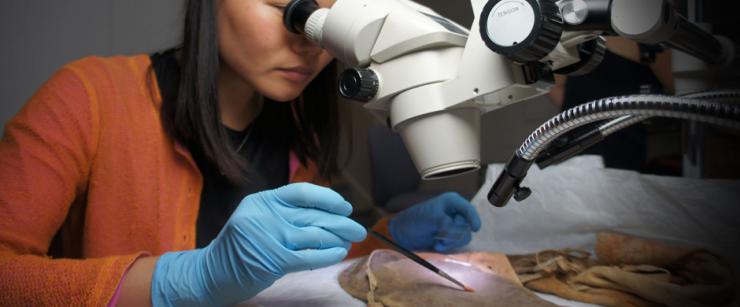
The Conservation Center of the Institute of Fine Arts is dedicated to the study of the technology and conservation of works of art and historic artefacts. It prepares students for careers in conservation through a four-year program that combines practical experience in conservation with historical, archaeological, curatorial, and scientific studies of the materials and construction of works of art. Students undertake research projects, laboratory work, seminars, and gain intensive conservation experience through advanced fieldwork and the Internship.A sampling of the modern/contemporary course offerings:
Examination & Conservation of Modern & Contemporary Paintings (instructor: Suzanne Siano)
The conservation of modern and contemporary paintings requires a set of skills that are different from those learned in studying Old Master pictures. Students in this course will learn how to examine a twentieth- or twenty-first-century painting and to write condition reports and treatment proposals; recognize the problems that are common to this period; become familiar with the materials used to make these works and the range of options to consolidate, clean, fill, and retouch them; understand the roles of the living artist in conservation and of the conservator in contemporary art; and learn about special problems such as colorfield paintings, oversized pictures, raw canvas, devarnishing, and condition problems arising from inherent vice and frequent handling. In addition to class projects, each student is assigned a painting for treatment within the semester.
Modern Materials & Media in Contemporary Art (instructor: Christine Frohnert)
The preservation of artworks containing modern materials and technology-based components is of increasing concern to the art conservation profession. Challenges are posed by the preservation of the works of art themselves, their artistic intent and due to the artworks very specific relationship to time, space and concept. The course will offer lectures introducing modern materials and technology-based media such as Kinetic, Light-Kinetic and Installation Art. In addition, each student is assigned an object for examination, research, treatment and documentation. Course projects will be selected based on the individual students' interest.
Subjectivity & the Preservation of Contemporary Art (instructor: Carol Stringari)
In recent years, the question of what should be preserved has become an issue with a multiplicity of solutions that challenge our notions of preservation and historical integrity. The goal of this seminar is to chart the course of a complex or conceptual contemporary artwork-using specific case studies chosen by students in conjunction with the instructor-from idea to conception, exhibition, documentation, and long-term preservation. The course includes an analysis of these stages and considers the perception of a work by various parties including the artist, spectators, critics, dealers, curators, and conservators. Through this exercise, the course elucidates the difficult decisions one makes when dealing with an artwork's power to transform itself over time and the decisions a conservator must make about preserving cultural patrimony. Complicated questions and differing perspectives in perception are discussed. What is the "medium"? How does one accurately interpret its concept, and from which perspective? How does an artist's attitude change over the years with various iterations of a work? Should spectators, the market, or an artist's estate influence our decisions about preservation? For comparison, the course will examine works from the 1970s to the present, spanning a range of media. A presentation and paper related to a case will be required of each student to complete the course. Some classes will be held at galleries, artist studios, or museums.
Conservation of Modern & Contemporary Sculpture (coordinator: Lynda Zycherman)
This course combines hands-on conservation with laboratory exercises, research, and lectures on conserving modern and contemporary sculpture. The range of works includes plastics, modern paints, modern alloys, time-based media, installations, and ephemera. Potential projects include surveys, research, and treatment. Course projects are selected based on individual student interest.